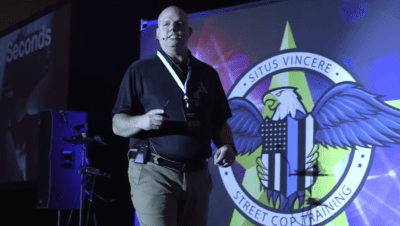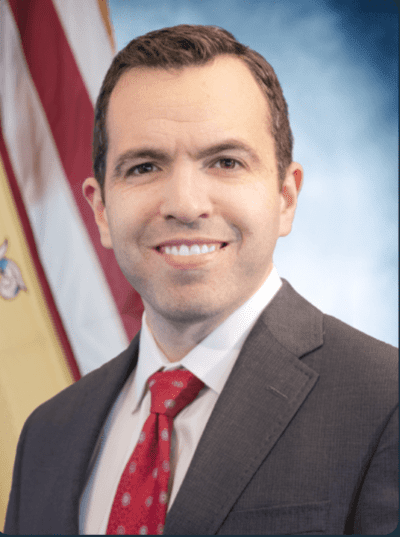Brevard Sheriff to Speak at Controversial “Street Cop Training” Conference in Orlando

Brevard County Sheriff Wayne Ivey, best known for his “Wheel of Fugitive” videos to publicize suspects at large, will be a featured speaker at a conference this month in Orlando held by a group that was banned from training law enforcement agencies in at least nine states last year.
The group, Street Cop Training, is a private for-profit company that provides in-person and online seminars for law enforcement officers. The company’s promotional material states, “We are changing the world of law enforcement by properly educating police officers on what they CAN do.” However, an uproar ensued when details from a previous conference the group held revealed how it promoted unprofessional and allegedly unconstitutional tactics that could result in wrongful arrests and lawsuits.
A call to Sheriff Ivey’s office for comment was transferred to Brevard’s public information officer Tod Goodyear, who didn’t return three voicemails from the Florida Trident. The office didn’t reply to emails requesting information about whether the department was sending any employees and paying the $699 fee to attend the six-day Street Cop Training Conference starting on April 28.

The controversy erupted after The Washington Post reported on Street Cop Training’s 2021 Atlantic City conference. After learning that 240 New Jersey police officers attended the conference, the New Jersey Office of the State Comptroller reviewed course material and videos of training sessions, then issued a scathing report this past December.
The comptroller’s report documented “over 100 discriminatory and harassing remarks by speakers and instructors, with repeated references to speakers’ genitalia, lewd gestures, and demeaning quips about women and minorities.”
One trainer put a slide of a monkey up while discussing stopping a car with a 75-year-old black man behind the wheel. Another talked about having sex with a female motorist he pulled over. Another instructor talked approvingly of drinking from an enemy’s skull. Street Cops founder and CEO Dennis Benigno told attendees, “I want to die at 91 with hookers and cocaine around me…I mean why wouldn’t that be your goal?”
The comptroller’s investigation also found that instructors gave unprofessional and possibly illegal advice to attendees and at least two advised using unconstitutional tactics for motor vehicle stops. One instructor recommended pulling over “20 people in a row for the sole purpose of asking them questions.” Another said he pulled over cars in Indiana for driving five miles slower than the posted speed limit because “it’s not logical.” Benigno joked that any motorist who invoked his constitutional rights during a traffic stop would get “pepper sprayed…and Tased.”
The instructors routinely “espoused views and tactics that would undermine almost a decade of police reform efforts in New Jersey, including those aimed at de-escalating civilian-police encounters, building trust with vulnerable populations, and increasing officers’ ability to understand, appreciate, and interact with New Jersey’s diverse population,” the comptroller’s report stated.

The New Jersey investigation determined that about $75,000 in public funds was used sending officers to the conference. New Jersey Attorney General Matt Platkin ordered the officers to attend a retraining session.
The retraining session was necessary “to rebut the inappropriate, inaccurate, and offensive lessons taught at that conference. The guidance promoted during that event was anathema to the values and the conduct that we expect of our law enforcement officers,” Platkin said in a statement.
As a result of that report, Street Cop Training declared bankruptcy in February.
“Shortly after the report was published, a number of Street Cop Training instructors resigned, and a number of states prohibited their law enforcement agencies from attending Street Cop Training seminars,” the company’s lawyer wrote in a bankruptcy motion.
The motion listed the states that banned Street Cop as New Jersey, Maryland, California, Illinois, Michigan, Minnesota, Missouri, Nevada, and Oregon. Benigno promptly sued the NJ Comptroller and moved the operation to Florida.
Street Cop Training did not respond to a request for comment. In a video response to the comptroller’s report, Benigno said he wanted to “personally take responsibility and apologize for any inappropriate or offensive language that was used by a few of our instructors. … We do important work and there is no place for demeaning, harassing or hateful words or jokes in our training.”
He also said “quality control” measures were put into place to make sure this didn’t happen again. At the same time he said his organization is always professional and never advised using unconstitutional policing strategies.

Brevard Sheriff Wayne Ivey is no stranger to controversy himself. The Florida Commission on Ethics investigated him in 2022 after he offered jobs to potential opponents in an upcoming election. He acknowledged offering the jobs, but said it wasn’t related to the election. When the potential candidates declined to talk to ethics investigators, no ethics charges were brought against him.
He also angered civil rights advocates when he reintroduced chain gangs. And he was sued by a man featured on one of his “Wheel of Fugitive” videos who was not a fugitive at the time. He said he lost a job as a result of the video.
Ivey is scheduled to speak about “leadership” at the Street Cop Training conference at 1:45 p.m. on April 29.
